Information Technology Ethics Report: Edward Snowden Case Analysis
VerifiedAdded on 2020/05/16
|10
|3468
|88
Report
AI Summary
This report provides an ethical analysis of the Edward Snowden case, examining his actions in the context of information technology ethics. The report employs two primary analytical frameworks: the Doing Ethics Technique (DET) and the Australian Computer Society (ACS) code of ethics. The DET is used to dissect the case's facts, ethical issues, affected parties, and potential solutions, offering a structured approach to understanding the ethical dimensions. The ACS code of ethics is applied to evaluate Snowden's actions against core values like public interest, honesty, competence, and professionalism. The analysis considers the impact of Snowden's actions on national security, privacy, and international relations, as well as the implications of his whistleblowing activities. The report concludes with a synthesis of the two analyses and offers recommendations based on the ethical considerations presented.
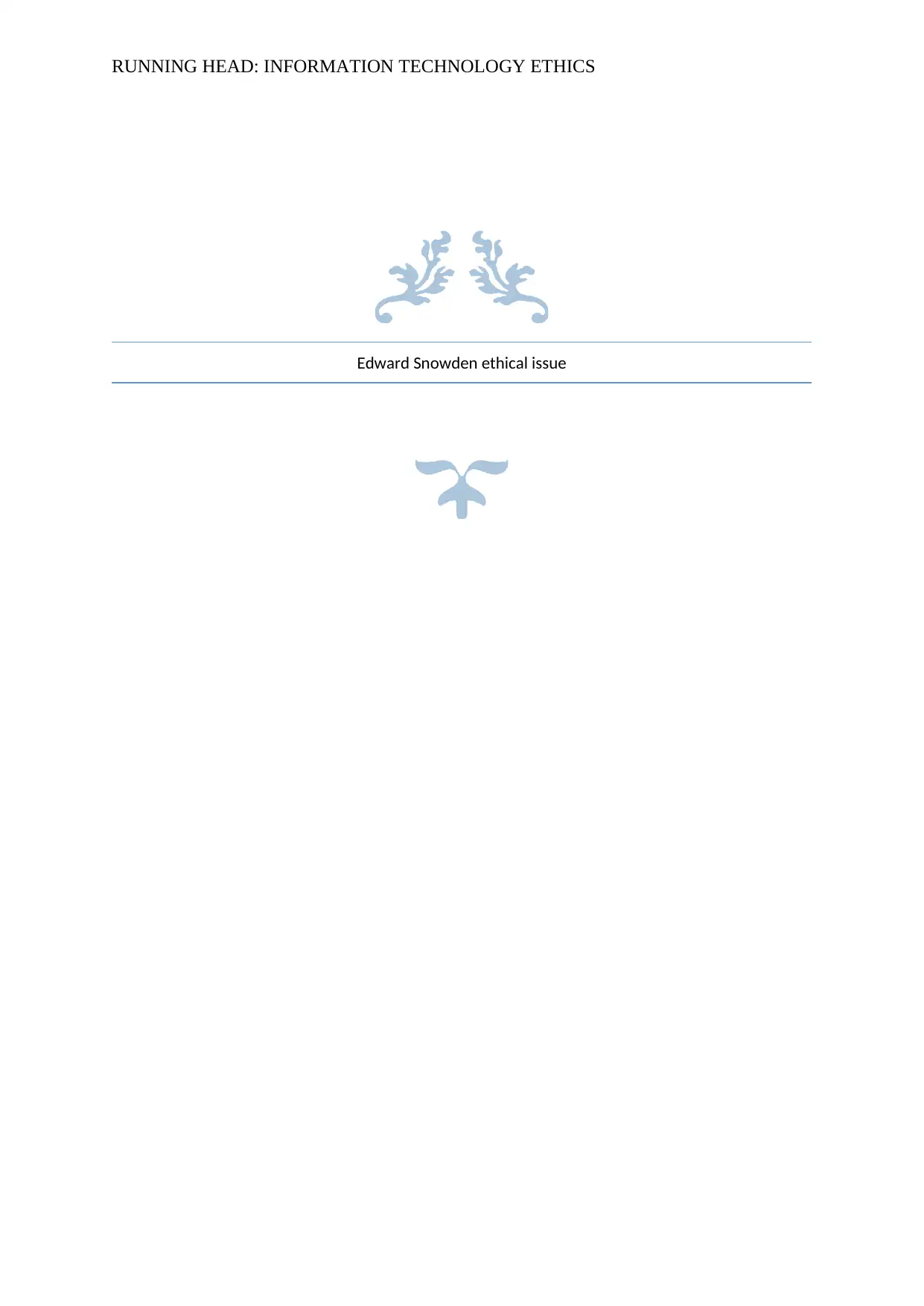
RUNNING HEAD: INFORMATION TECHNOLOGY ETHICS
Edward Snowden ethical issue
Edward Snowden ethical issue
Paraphrase This Document
Need a fresh take? Get an instant paraphrase of this document with our AI Paraphraser
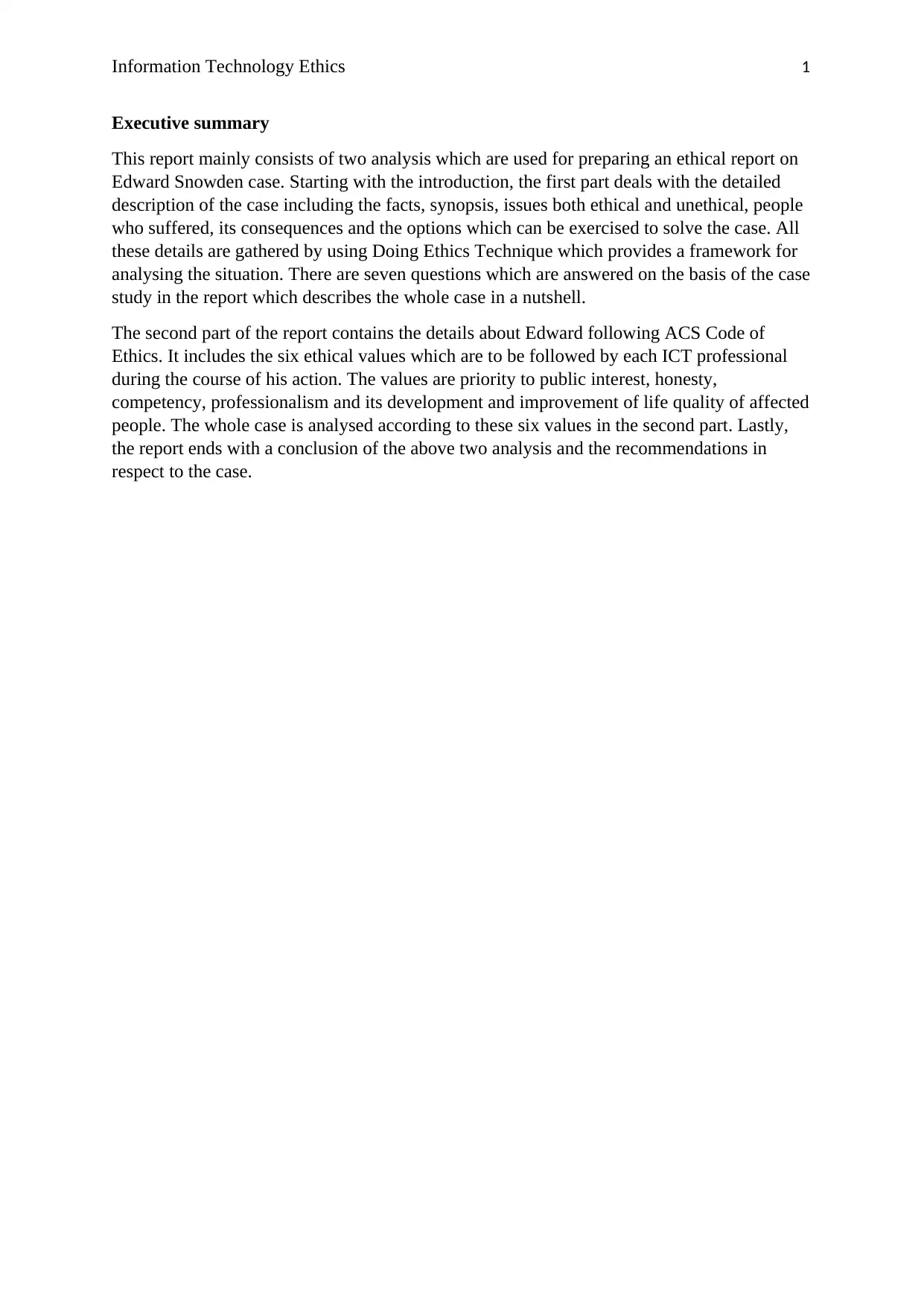
Information Technology Ethics 1
Executive summary
This report mainly consists of two analysis which are used for preparing an ethical report on
Edward Snowden case. Starting with the introduction, the first part deals with the detailed
description of the case including the facts, synopsis, issues both ethical and unethical, people
who suffered, its consequences and the options which can be exercised to solve the case. All
these details are gathered by using Doing Ethics Technique which provides a framework for
analysing the situation. There are seven questions which are answered on the basis of the case
study in the report which describes the whole case in a nutshell.
The second part of the report contains the details about Edward following ACS Code of
Ethics. It includes the six ethical values which are to be followed by each ICT professional
during the course of his action. The values are priority to public interest, honesty,
competency, professionalism and its development and improvement of life quality of affected
people. The whole case is analysed according to these six values in the second part. Lastly,
the report ends with a conclusion of the above two analysis and the recommendations in
respect to the case.
Executive summary
This report mainly consists of two analysis which are used for preparing an ethical report on
Edward Snowden case. Starting with the introduction, the first part deals with the detailed
description of the case including the facts, synopsis, issues both ethical and unethical, people
who suffered, its consequences and the options which can be exercised to solve the case. All
these details are gathered by using Doing Ethics Technique which provides a framework for
analysing the situation. There are seven questions which are answered on the basis of the case
study in the report which describes the whole case in a nutshell.
The second part of the report contains the details about Edward following ACS Code of
Ethics. It includes the six ethical values which are to be followed by each ICT professional
during the course of his action. The values are priority to public interest, honesty,
competency, professionalism and its development and improvement of life quality of affected
people. The whole case is analysed according to these six values in the second part. Lastly,
the report ends with a conclusion of the above two analysis and the recommendations in
respect to the case.
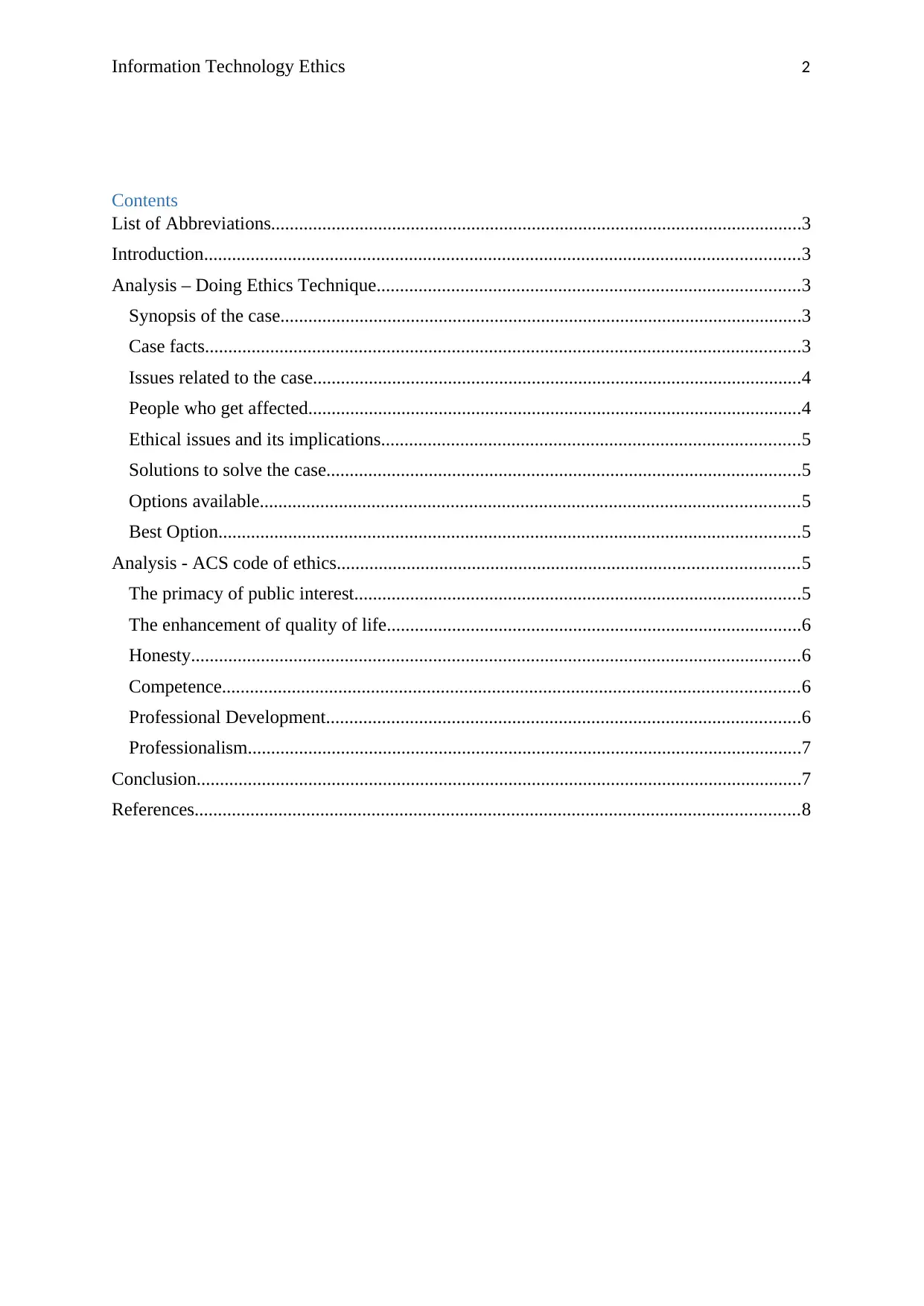
Information Technology Ethics 2
Contents
List of Abbreviations..................................................................................................................3
Introduction................................................................................................................................3
Analysis – Doing Ethics Technique...........................................................................................3
Synopsis of the case................................................................................................................3
Case facts................................................................................................................................3
Issues related to the case.........................................................................................................4
People who get affected..........................................................................................................4
Ethical issues and its implications..........................................................................................5
Solutions to solve the case......................................................................................................5
Options available....................................................................................................................5
Best Option.............................................................................................................................5
Analysis - ACS code of ethics...................................................................................................5
The primacy of public interest................................................................................................5
The enhancement of quality of life.........................................................................................6
Honesty...................................................................................................................................6
Competence............................................................................................................................6
Professional Development......................................................................................................6
Professionalism.......................................................................................................................7
Conclusion..................................................................................................................................7
References..................................................................................................................................8
Contents
List of Abbreviations..................................................................................................................3
Introduction................................................................................................................................3
Analysis – Doing Ethics Technique...........................................................................................3
Synopsis of the case................................................................................................................3
Case facts................................................................................................................................3
Issues related to the case.........................................................................................................4
People who get affected..........................................................................................................4
Ethical issues and its implications..........................................................................................5
Solutions to solve the case......................................................................................................5
Options available....................................................................................................................5
Best Option.............................................................................................................................5
Analysis - ACS code of ethics...................................................................................................5
The primacy of public interest................................................................................................5
The enhancement of quality of life.........................................................................................6
Honesty...................................................................................................................................6
Competence............................................................................................................................6
Professional Development......................................................................................................6
Professionalism.......................................................................................................................7
Conclusion..................................................................................................................................7
References..................................................................................................................................8
⊘ This is a preview!⊘
Do you want full access?
Subscribe today to unlock all pages.

Trusted by 1+ million students worldwide
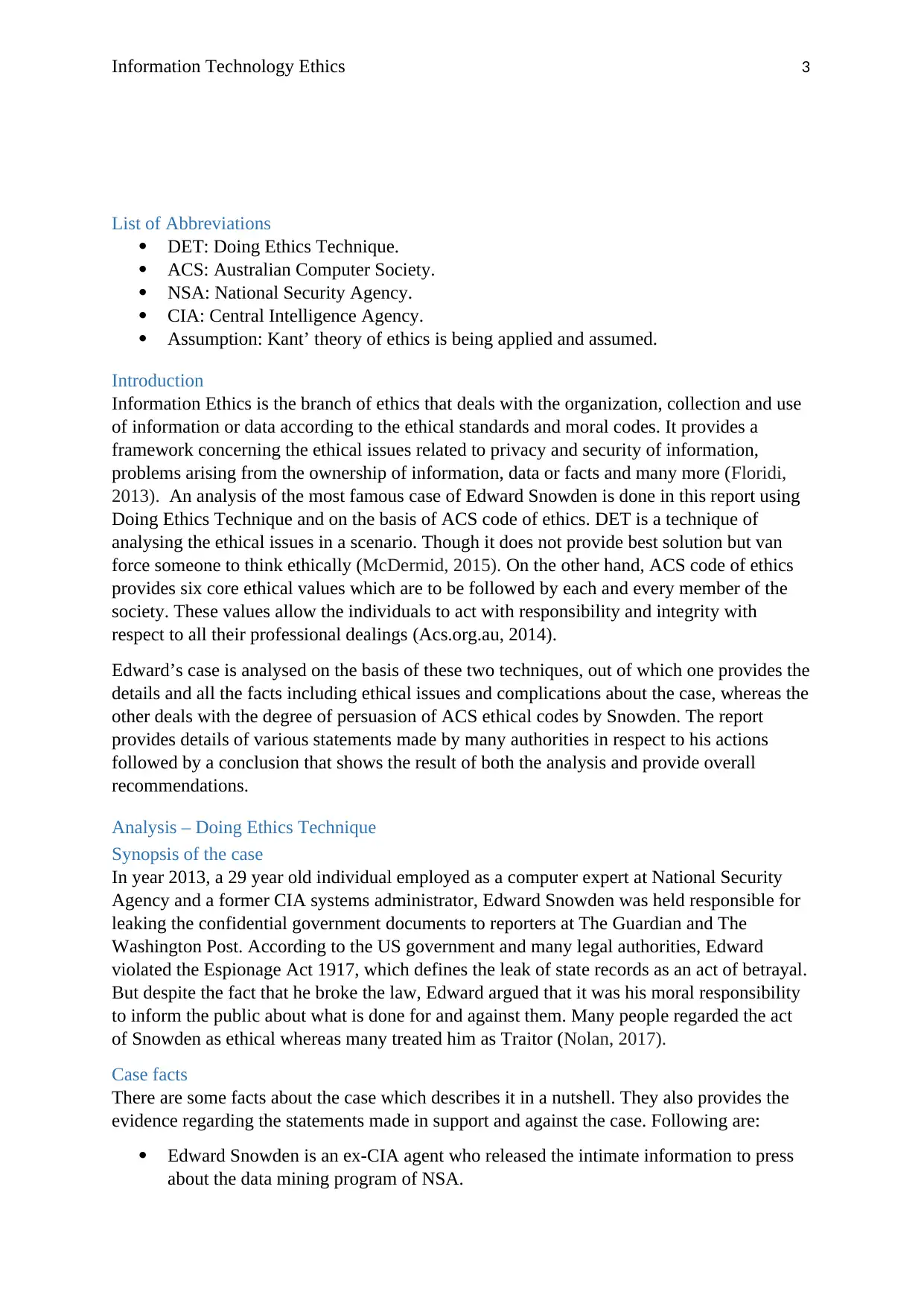
Information Technology Ethics 3
List of Abbreviations
DET: Doing Ethics Technique.
ACS: Australian Computer Society.
NSA: National Security Agency.
CIA: Central Intelligence Agency.
Assumption: Kant’ theory of ethics is being applied and assumed.
Introduction
Information Ethics is the branch of ethics that deals with the organization, collection and use
of information or data according to the ethical standards and moral codes. It provides a
framework concerning the ethical issues related to privacy and security of information,
problems arising from the ownership of information, data or facts and many more (Floridi,
2013). An analysis of the most famous case of Edward Snowden is done in this report using
Doing Ethics Technique and on the basis of ACS code of ethics. DET is a technique of
analysing the ethical issues in a scenario. Though it does not provide best solution but van
force someone to think ethically (McDermid, 2015). On the other hand, ACS code of ethics
provides six core ethical values which are to be followed by each and every member of the
society. These values allow the individuals to act with responsibility and integrity with
respect to all their professional dealings (Acs.org.au, 2014).
Edward’s case is analysed on the basis of these two techniques, out of which one provides the
details and all the facts including ethical issues and complications about the case, whereas the
other deals with the degree of persuasion of ACS ethical codes by Snowden. The report
provides details of various statements made by many authorities in respect to his actions
followed by a conclusion that shows the result of both the analysis and provide overall
recommendations.
Analysis – Doing Ethics Technique
Synopsis of the case
In year 2013, a 29 year old individual employed as a computer expert at National Security
Agency and a former CIA systems administrator, Edward Snowden was held responsible for
leaking the confidential government documents to reporters at The Guardian and The
Washington Post. According to the US government and many legal authorities, Edward
violated the Espionage Act 1917, which defines the leak of state records as an act of betrayal.
But despite the fact that he broke the law, Edward argued that it was his moral responsibility
to inform the public about what is done for and against them. Many people regarded the act
of Snowden as ethical whereas many treated him as Traitor (Nolan, 2017).
Case facts
There are some facts about the case which describes it in a nutshell. They also provides the
evidence regarding the statements made in support and against the case. Following are:
Edward Snowden is an ex-CIA agent who released the intimate information to press
about the data mining program of NSA.
List of Abbreviations
DET: Doing Ethics Technique.
ACS: Australian Computer Society.
NSA: National Security Agency.
CIA: Central Intelligence Agency.
Assumption: Kant’ theory of ethics is being applied and assumed.
Introduction
Information Ethics is the branch of ethics that deals with the organization, collection and use
of information or data according to the ethical standards and moral codes. It provides a
framework concerning the ethical issues related to privacy and security of information,
problems arising from the ownership of information, data or facts and many more (Floridi,
2013). An analysis of the most famous case of Edward Snowden is done in this report using
Doing Ethics Technique and on the basis of ACS code of ethics. DET is a technique of
analysing the ethical issues in a scenario. Though it does not provide best solution but van
force someone to think ethically (McDermid, 2015). On the other hand, ACS code of ethics
provides six core ethical values which are to be followed by each and every member of the
society. These values allow the individuals to act with responsibility and integrity with
respect to all their professional dealings (Acs.org.au, 2014).
Edward’s case is analysed on the basis of these two techniques, out of which one provides the
details and all the facts including ethical issues and complications about the case, whereas the
other deals with the degree of persuasion of ACS ethical codes by Snowden. The report
provides details of various statements made by many authorities in respect to his actions
followed by a conclusion that shows the result of both the analysis and provide overall
recommendations.
Analysis – Doing Ethics Technique
Synopsis of the case
In year 2013, a 29 year old individual employed as a computer expert at National Security
Agency and a former CIA systems administrator, Edward Snowden was held responsible for
leaking the confidential government documents to reporters at The Guardian and The
Washington Post. According to the US government and many legal authorities, Edward
violated the Espionage Act 1917, which defines the leak of state records as an act of betrayal.
But despite the fact that he broke the law, Edward argued that it was his moral responsibility
to inform the public about what is done for and against them. Many people regarded the act
of Snowden as ethical whereas many treated him as Traitor (Nolan, 2017).
Case facts
There are some facts about the case which describes it in a nutshell. They also provides the
evidence regarding the statements made in support and against the case. Following are:
Edward Snowden is an ex-CIA agent who released the intimate information to press
about the data mining program of NSA.
Paraphrase This Document
Need a fresh take? Get an instant paraphrase of this document with our AI Paraphraser
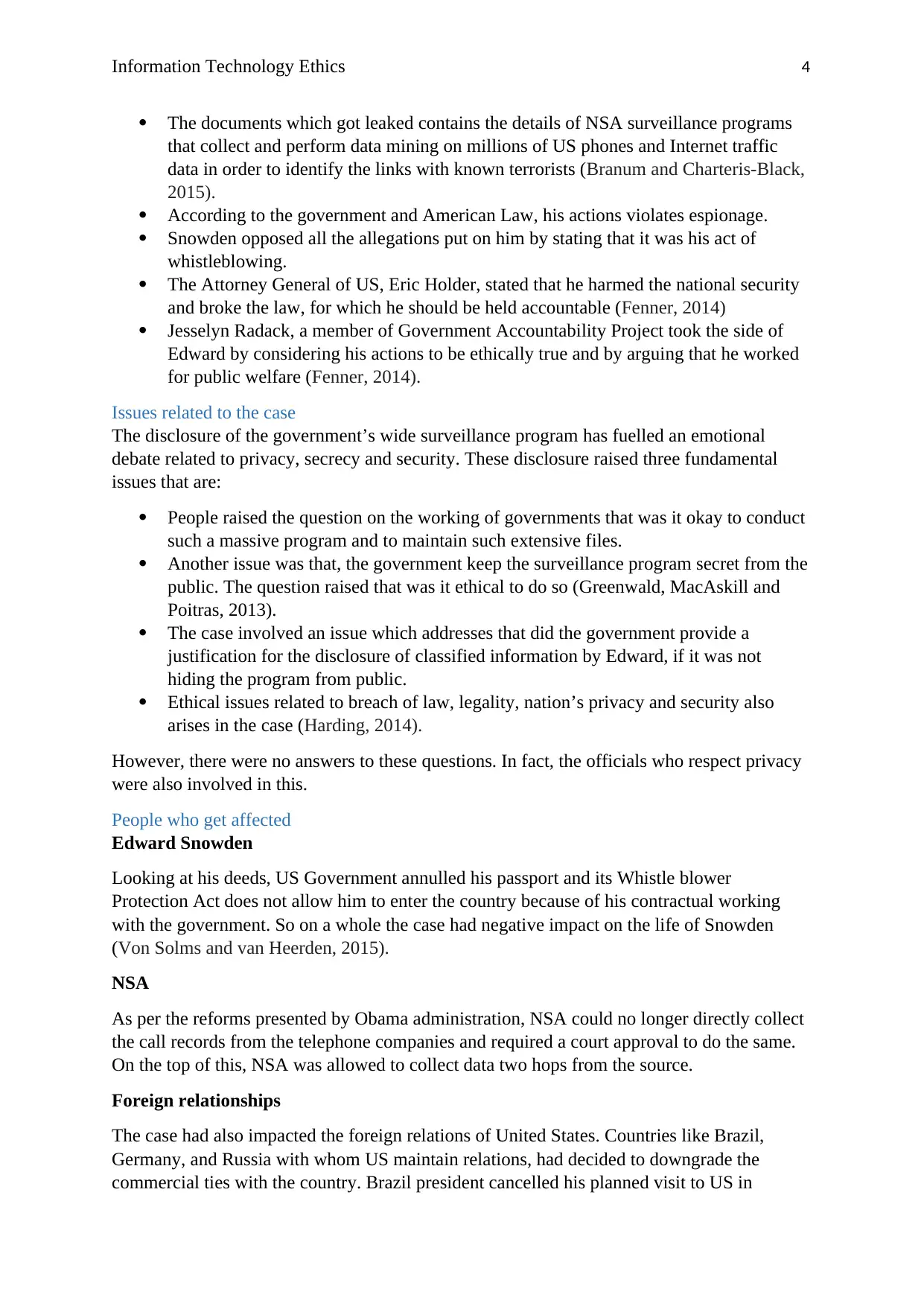
Information Technology Ethics 4
The documents which got leaked contains the details of NSA surveillance programs
that collect and perform data mining on millions of US phones and Internet traffic
data in order to identify the links with known terrorists (Branum and Charteris-Black,
2015).
According to the government and American Law, his actions violates espionage.
Snowden opposed all the allegations put on him by stating that it was his act of
whistleblowing.
The Attorney General of US, Eric Holder, stated that he harmed the national security
and broke the law, for which he should be held accountable (Fenner, 2014)
Jesselyn Radack, a member of Government Accountability Project took the side of
Edward by considering his actions to be ethically true and by arguing that he worked
for public welfare (Fenner, 2014).
Issues related to the case
The disclosure of the government’s wide surveillance program has fuelled an emotional
debate related to privacy, secrecy and security. These disclosure raised three fundamental
issues that are:
People raised the question on the working of governments that was it okay to conduct
such a massive program and to maintain such extensive files.
Another issue was that, the government keep the surveillance program secret from the
public. The question raised that was it ethical to do so (Greenwald, MacAskill and
Poitras, 2013).
The case involved an issue which addresses that did the government provide a
justification for the disclosure of classified information by Edward, if it was not
hiding the program from public.
Ethical issues related to breach of law, legality, nation’s privacy and security also
arises in the case (Harding, 2014).
However, there were no answers to these questions. In fact, the officials who respect privacy
were also involved in this.
People who get affected
Edward Snowden
Looking at his deeds, US Government annulled his passport and its Whistle blower
Protection Act does not allow him to enter the country because of his contractual working
with the government. So on a whole the case had negative impact on the life of Snowden
(Von Solms and van Heerden, 2015).
NSA
As per the reforms presented by Obama administration, NSA could no longer directly collect
the call records from the telephone companies and required a court approval to do the same.
On the top of this, NSA was allowed to collect data two hops from the source.
Foreign relationships
The case had also impacted the foreign relations of United States. Countries like Brazil,
Germany, and Russia with whom US maintain relations, had decided to downgrade the
commercial ties with the country. Brazil president cancelled his planned visit to US in
The documents which got leaked contains the details of NSA surveillance programs
that collect and perform data mining on millions of US phones and Internet traffic
data in order to identify the links with known terrorists (Branum and Charteris-Black,
2015).
According to the government and American Law, his actions violates espionage.
Snowden opposed all the allegations put on him by stating that it was his act of
whistleblowing.
The Attorney General of US, Eric Holder, stated that he harmed the national security
and broke the law, for which he should be held accountable (Fenner, 2014)
Jesselyn Radack, a member of Government Accountability Project took the side of
Edward by considering his actions to be ethically true and by arguing that he worked
for public welfare (Fenner, 2014).
Issues related to the case
The disclosure of the government’s wide surveillance program has fuelled an emotional
debate related to privacy, secrecy and security. These disclosure raised three fundamental
issues that are:
People raised the question on the working of governments that was it okay to conduct
such a massive program and to maintain such extensive files.
Another issue was that, the government keep the surveillance program secret from the
public. The question raised that was it ethical to do so (Greenwald, MacAskill and
Poitras, 2013).
The case involved an issue which addresses that did the government provide a
justification for the disclosure of classified information by Edward, if it was not
hiding the program from public.
Ethical issues related to breach of law, legality, nation’s privacy and security also
arises in the case (Harding, 2014).
However, there were no answers to these questions. In fact, the officials who respect privacy
were also involved in this.
People who get affected
Edward Snowden
Looking at his deeds, US Government annulled his passport and its Whistle blower
Protection Act does not allow him to enter the country because of his contractual working
with the government. So on a whole the case had negative impact on the life of Snowden
(Von Solms and van Heerden, 2015).
NSA
As per the reforms presented by Obama administration, NSA could no longer directly collect
the call records from the telephone companies and required a court approval to do the same.
On the top of this, NSA was allowed to collect data two hops from the source.
Foreign relationships
The case had also impacted the foreign relations of United States. Countries like Brazil,
Germany, and Russia with whom US maintain relations, had decided to downgrade the
commercial ties with the country. Brazil president cancelled his planned visit to US in
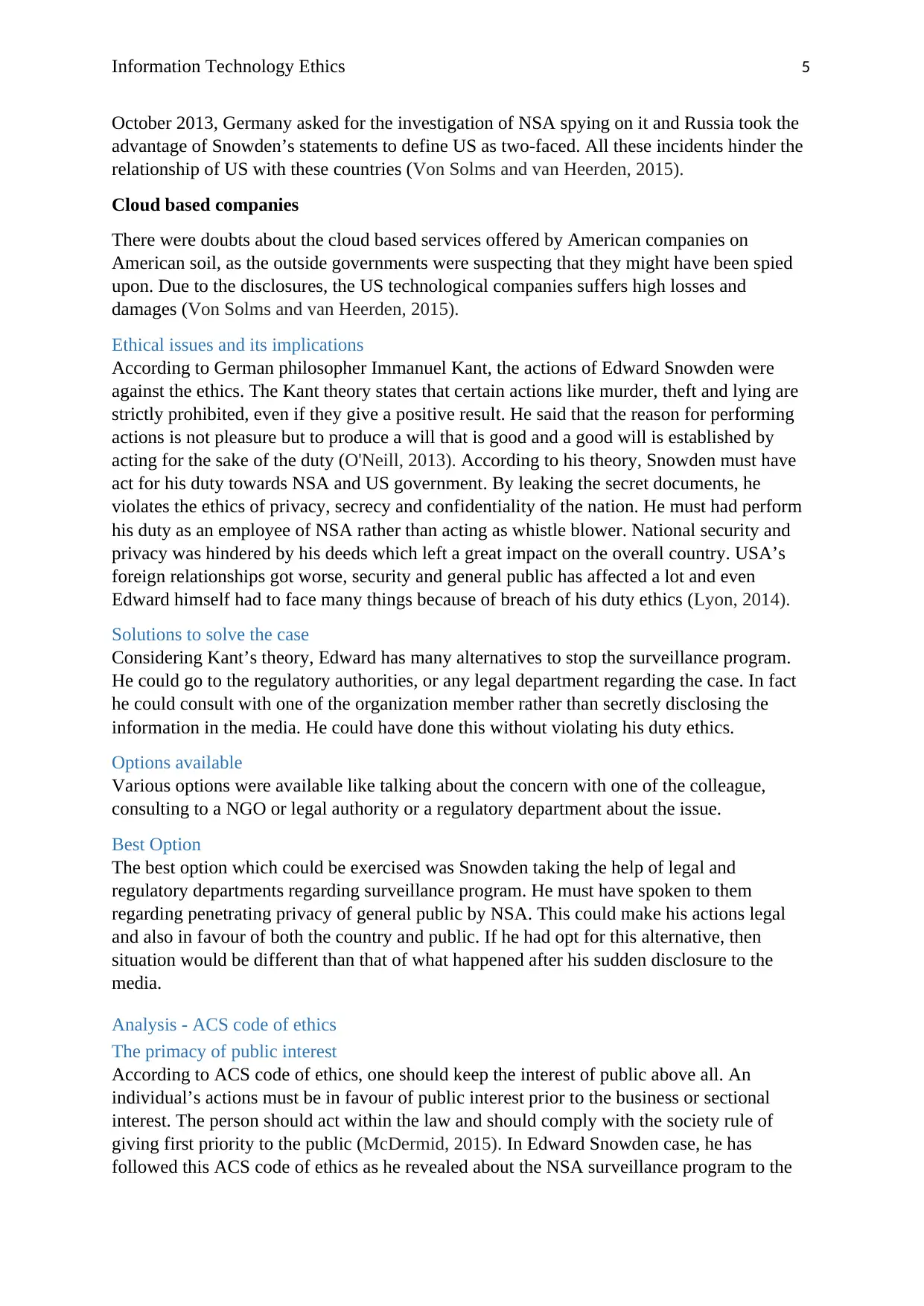
Information Technology Ethics 5
October 2013, Germany asked for the investigation of NSA spying on it and Russia took the
advantage of Snowden’s statements to define US as two-faced. All these incidents hinder the
relationship of US with these countries (Von Solms and van Heerden, 2015).
Cloud based companies
There were doubts about the cloud based services offered by American companies on
American soil, as the outside governments were suspecting that they might have been spied
upon. Due to the disclosures, the US technological companies suffers high losses and
damages (Von Solms and van Heerden, 2015).
Ethical issues and its implications
According to German philosopher Immanuel Kant, the actions of Edward Snowden were
against the ethics. The Kant theory states that certain actions like murder, theft and lying are
strictly prohibited, even if they give a positive result. He said that the reason for performing
actions is not pleasure but to produce a will that is good and a good will is established by
acting for the sake of the duty (O'Neill, 2013). According to his theory, Snowden must have
act for his duty towards NSA and US government. By leaking the secret documents, he
violates the ethics of privacy, secrecy and confidentiality of the nation. He must had perform
his duty as an employee of NSA rather than acting as whistle blower. National security and
privacy was hindered by his deeds which left a great impact on the overall country. USA’s
foreign relationships got worse, security and general public has affected a lot and even
Edward himself had to face many things because of breach of his duty ethics (Lyon, 2014).
Solutions to solve the case
Considering Kant’s theory, Edward has many alternatives to stop the surveillance program.
He could go to the regulatory authorities, or any legal department regarding the case. In fact
he could consult with one of the organization member rather than secretly disclosing the
information in the media. He could have done this without violating his duty ethics.
Options available
Various options were available like talking about the concern with one of the colleague,
consulting to a NGO or legal authority or a regulatory department about the issue.
Best Option
The best option which could be exercised was Snowden taking the help of legal and
regulatory departments regarding surveillance program. He must have spoken to them
regarding penetrating privacy of general public by NSA. This could make his actions legal
and also in favour of both the country and public. If he had opt for this alternative, then
situation would be different than that of what happened after his sudden disclosure to the
media.
Analysis - ACS code of ethics
The primacy of public interest
According to ACS code of ethics, one should keep the interest of public above all. An
individual’s actions must be in favour of public interest prior to the business or sectional
interest. The person should act within the law and should comply with the society rule of
giving first priority to the public (McDermid, 2015). In Edward Snowden case, he has
followed this ACS code of ethics as he revealed about the NSA surveillance program to the
October 2013, Germany asked for the investigation of NSA spying on it and Russia took the
advantage of Snowden’s statements to define US as two-faced. All these incidents hinder the
relationship of US with these countries (Von Solms and van Heerden, 2015).
Cloud based companies
There were doubts about the cloud based services offered by American companies on
American soil, as the outside governments were suspecting that they might have been spied
upon. Due to the disclosures, the US technological companies suffers high losses and
damages (Von Solms and van Heerden, 2015).
Ethical issues and its implications
According to German philosopher Immanuel Kant, the actions of Edward Snowden were
against the ethics. The Kant theory states that certain actions like murder, theft and lying are
strictly prohibited, even if they give a positive result. He said that the reason for performing
actions is not pleasure but to produce a will that is good and a good will is established by
acting for the sake of the duty (O'Neill, 2013). According to his theory, Snowden must have
act for his duty towards NSA and US government. By leaking the secret documents, he
violates the ethics of privacy, secrecy and confidentiality of the nation. He must had perform
his duty as an employee of NSA rather than acting as whistle blower. National security and
privacy was hindered by his deeds which left a great impact on the overall country. USA’s
foreign relationships got worse, security and general public has affected a lot and even
Edward himself had to face many things because of breach of his duty ethics (Lyon, 2014).
Solutions to solve the case
Considering Kant’s theory, Edward has many alternatives to stop the surveillance program.
He could go to the regulatory authorities, or any legal department regarding the case. In fact
he could consult with one of the organization member rather than secretly disclosing the
information in the media. He could have done this without violating his duty ethics.
Options available
Various options were available like talking about the concern with one of the colleague,
consulting to a NGO or legal authority or a regulatory department about the issue.
Best Option
The best option which could be exercised was Snowden taking the help of legal and
regulatory departments regarding surveillance program. He must have spoken to them
regarding penetrating privacy of general public by NSA. This could make his actions legal
and also in favour of both the country and public. If he had opt for this alternative, then
situation would be different than that of what happened after his sudden disclosure to the
media.
Analysis - ACS code of ethics
The primacy of public interest
According to ACS code of ethics, one should keep the interest of public above all. An
individual’s actions must be in favour of public interest prior to the business or sectional
interest. The person should act within the law and should comply with the society rule of
giving first priority to the public (McDermid, 2015). In Edward Snowden case, he has
followed this ACS code of ethics as he revealed about the NSA surveillance program to the
⊘ This is a preview!⊘
Do you want full access?
Subscribe today to unlock all pages.

Trusted by 1+ million students worldwide
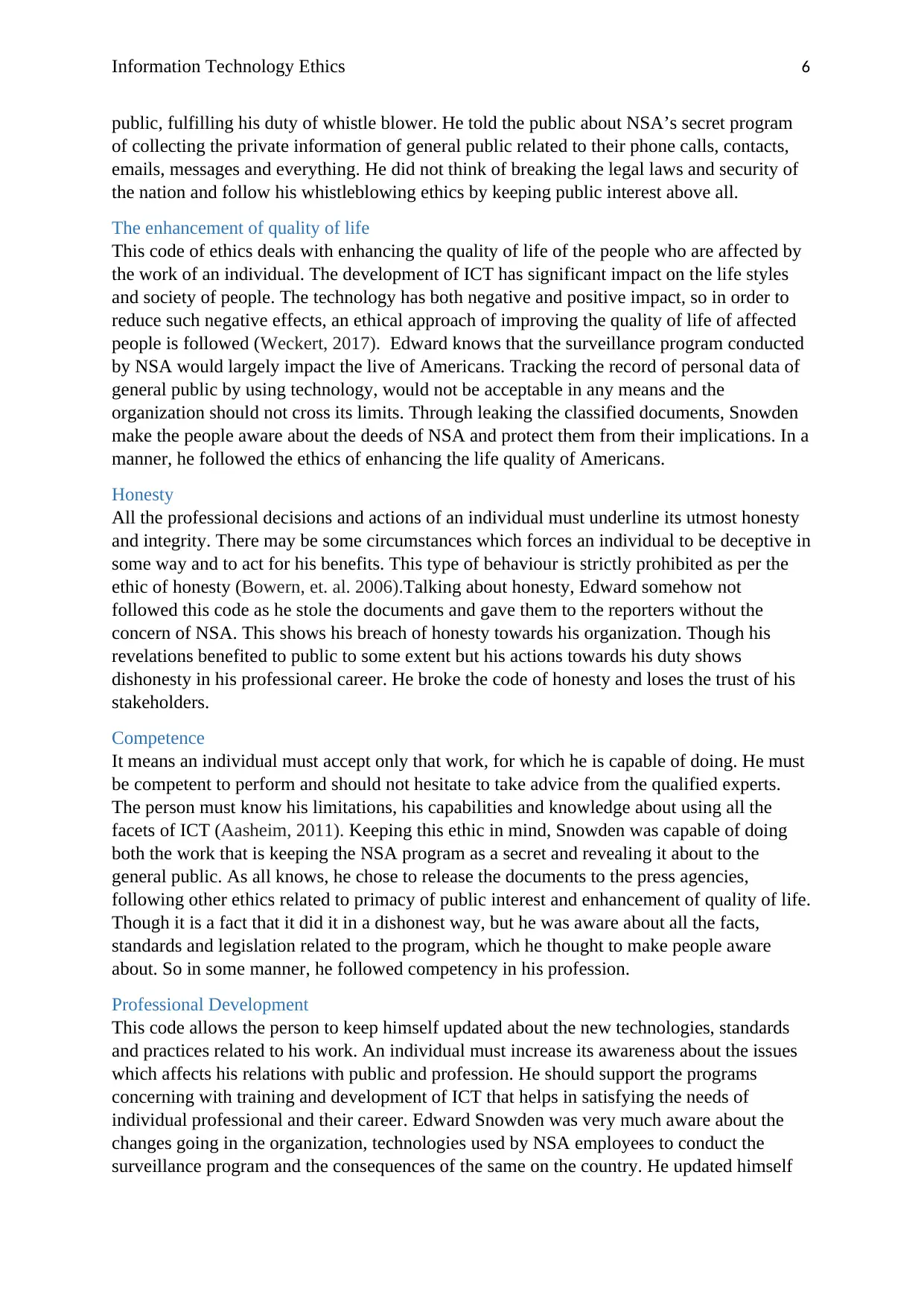
Information Technology Ethics 6
public, fulfilling his duty of whistle blower. He told the public about NSA’s secret program
of collecting the private information of general public related to their phone calls, contacts,
emails, messages and everything. He did not think of breaking the legal laws and security of
the nation and follow his whistleblowing ethics by keeping public interest above all.
The enhancement of quality of life
This code of ethics deals with enhancing the quality of life of the people who are affected by
the work of an individual. The development of ICT has significant impact on the life styles
and society of people. The technology has both negative and positive impact, so in order to
reduce such negative effects, an ethical approach of improving the quality of life of affected
people is followed (Weckert, 2017). Edward knows that the surveillance program conducted
by NSA would largely impact the live of Americans. Tracking the record of personal data of
general public by using technology, would not be acceptable in any means and the
organization should not cross its limits. Through leaking the classified documents, Snowden
make the people aware about the deeds of NSA and protect them from their implications. In a
manner, he followed the ethics of enhancing the life quality of Americans.
Honesty
All the professional decisions and actions of an individual must underline its utmost honesty
and integrity. There may be some circumstances which forces an individual to be deceptive in
some way and to act for his benefits. This type of behaviour is strictly prohibited as per the
ethic of honesty (Bowern, et. al. 2006).Talking about honesty, Edward somehow not
followed this code as he stole the documents and gave them to the reporters without the
concern of NSA. This shows his breach of honesty towards his organization. Though his
revelations benefited to public to some extent but his actions towards his duty shows
dishonesty in his professional career. He broke the code of honesty and loses the trust of his
stakeholders.
Competence
It means an individual must accept only that work, for which he is capable of doing. He must
be competent to perform and should not hesitate to take advice from the qualified experts.
The person must know his limitations, his capabilities and knowledge about using all the
facets of ICT (Aasheim, 2011). Keeping this ethic in mind, Snowden was capable of doing
both the work that is keeping the NSA program as a secret and revealing it about to the
general public. As all knows, he chose to release the documents to the press agencies,
following other ethics related to primacy of public interest and enhancement of quality of life.
Though it is a fact that it did it in a dishonest way, but he was aware about all the facts,
standards and legislation related to the program, which he thought to make people aware
about. So in some manner, he followed competency in his profession.
Professional Development
This code allows the person to keep himself updated about the new technologies, standards
and practices related to his work. An individual must increase its awareness about the issues
which affects his relations with public and profession. He should support the programs
concerning with training and development of ICT that helps in satisfying the needs of
individual professional and their career. Edward Snowden was very much aware about the
changes going in the organization, technologies used by NSA employees to conduct the
surveillance program and the consequences of the same on the country. He updated himself
public, fulfilling his duty of whistle blower. He told the public about NSA’s secret program
of collecting the private information of general public related to their phone calls, contacts,
emails, messages and everything. He did not think of breaking the legal laws and security of
the nation and follow his whistleblowing ethics by keeping public interest above all.
The enhancement of quality of life
This code of ethics deals with enhancing the quality of life of the people who are affected by
the work of an individual. The development of ICT has significant impact on the life styles
and society of people. The technology has both negative and positive impact, so in order to
reduce such negative effects, an ethical approach of improving the quality of life of affected
people is followed (Weckert, 2017). Edward knows that the surveillance program conducted
by NSA would largely impact the live of Americans. Tracking the record of personal data of
general public by using technology, would not be acceptable in any means and the
organization should not cross its limits. Through leaking the classified documents, Snowden
make the people aware about the deeds of NSA and protect them from their implications. In a
manner, he followed the ethics of enhancing the life quality of Americans.
Honesty
All the professional decisions and actions of an individual must underline its utmost honesty
and integrity. There may be some circumstances which forces an individual to be deceptive in
some way and to act for his benefits. This type of behaviour is strictly prohibited as per the
ethic of honesty (Bowern, et. al. 2006).Talking about honesty, Edward somehow not
followed this code as he stole the documents and gave them to the reporters without the
concern of NSA. This shows his breach of honesty towards his organization. Though his
revelations benefited to public to some extent but his actions towards his duty shows
dishonesty in his professional career. He broke the code of honesty and loses the trust of his
stakeholders.
Competence
It means an individual must accept only that work, for which he is capable of doing. He must
be competent to perform and should not hesitate to take advice from the qualified experts.
The person must know his limitations, his capabilities and knowledge about using all the
facets of ICT (Aasheim, 2011). Keeping this ethic in mind, Snowden was capable of doing
both the work that is keeping the NSA program as a secret and revealing it about to the
general public. As all knows, he chose to release the documents to the press agencies,
following other ethics related to primacy of public interest and enhancement of quality of life.
Though it is a fact that it did it in a dishonest way, but he was aware about all the facts,
standards and legislation related to the program, which he thought to make people aware
about. So in some manner, he followed competency in his profession.
Professional Development
This code allows the person to keep himself updated about the new technologies, standards
and practices related to his work. An individual must increase its awareness about the issues
which affects his relations with public and profession. He should support the programs
concerning with training and development of ICT that helps in satisfying the needs of
individual professional and their career. Edward Snowden was very much aware about the
changes going in the organization, technologies used by NSA employees to conduct the
surveillance program and the consequences of the same on the country. He updated himself
Paraphrase This Document
Need a fresh take? Get an instant paraphrase of this document with our AI Paraphraser
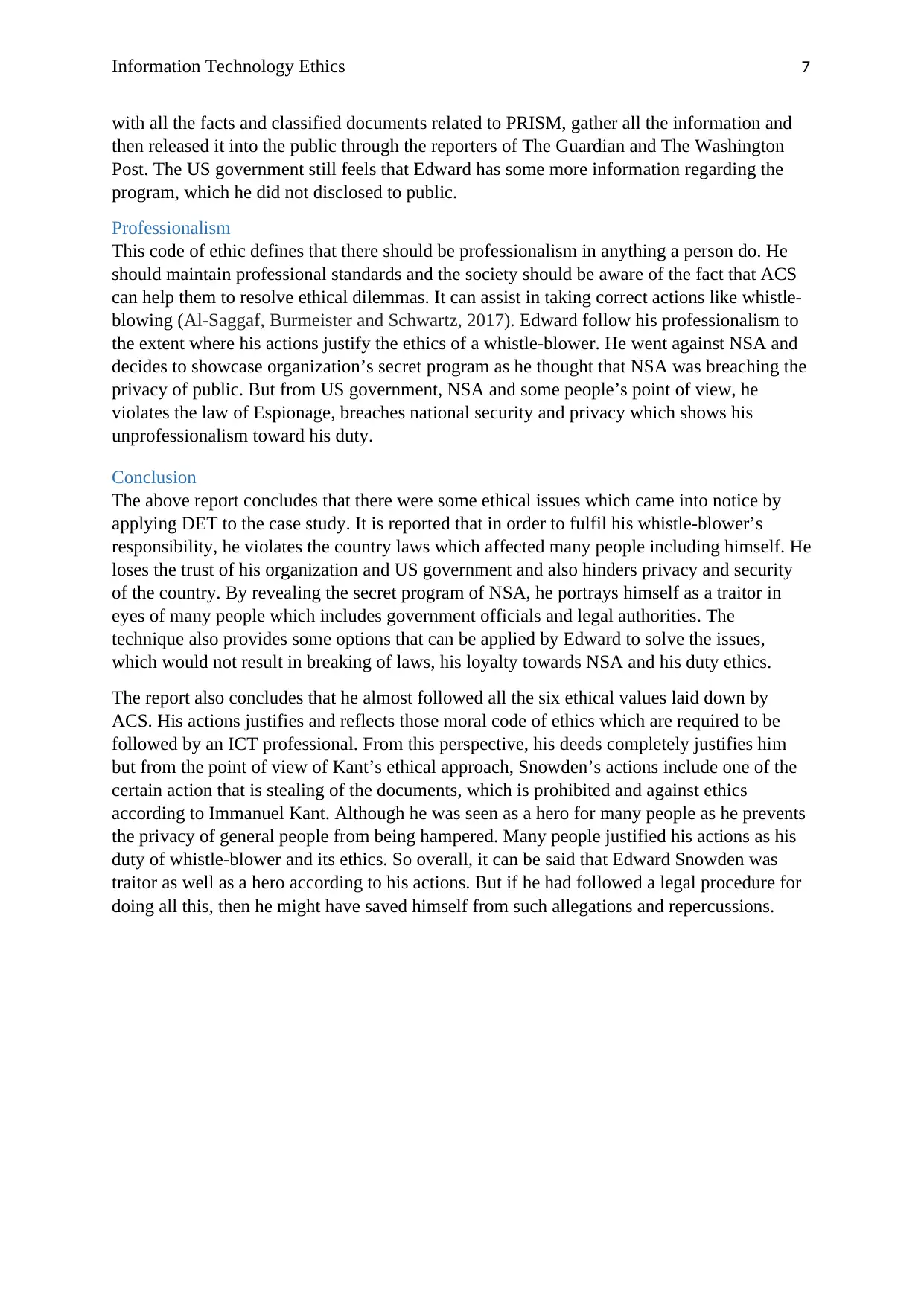
Information Technology Ethics 7
with all the facts and classified documents related to PRISM, gather all the information and
then released it into the public through the reporters of The Guardian and The Washington
Post. The US government still feels that Edward has some more information regarding the
program, which he did not disclosed to public.
Professionalism
This code of ethic defines that there should be professionalism in anything a person do. He
should maintain professional standards and the society should be aware of the fact that ACS
can help them to resolve ethical dilemmas. It can assist in taking correct actions like whistle-
blowing (Al-Saggaf, Burmeister and Schwartz, 2017). Edward follow his professionalism to
the extent where his actions justify the ethics of a whistle-blower. He went against NSA and
decides to showcase organization’s secret program as he thought that NSA was breaching the
privacy of public. But from US government, NSA and some people’s point of view, he
violates the law of Espionage, breaches national security and privacy which shows his
unprofessionalism toward his duty.
Conclusion
The above report concludes that there were some ethical issues which came into notice by
applying DET to the case study. It is reported that in order to fulfil his whistle-blower’s
responsibility, he violates the country laws which affected many people including himself. He
loses the trust of his organization and US government and also hinders privacy and security
of the country. By revealing the secret program of NSA, he portrays himself as a traitor in
eyes of many people which includes government officials and legal authorities. The
technique also provides some options that can be applied by Edward to solve the issues,
which would not result in breaking of laws, his loyalty towards NSA and his duty ethics.
The report also concludes that he almost followed all the six ethical values laid down by
ACS. His actions justifies and reflects those moral code of ethics which are required to be
followed by an ICT professional. From this perspective, his deeds completely justifies him
but from the point of view of Kant’s ethical approach, Snowden’s actions include one of the
certain action that is stealing of the documents, which is prohibited and against ethics
according to Immanuel Kant. Although he was seen as a hero for many people as he prevents
the privacy of general people from being hampered. Many people justified his actions as his
duty of whistle-blower and its ethics. So overall, it can be said that Edward Snowden was
traitor as well as a hero according to his actions. But if he had followed a legal procedure for
doing all this, then he might have saved himself from such allegations and repercussions.
with all the facts and classified documents related to PRISM, gather all the information and
then released it into the public through the reporters of The Guardian and The Washington
Post. The US government still feels that Edward has some more information regarding the
program, which he did not disclosed to public.
Professionalism
This code of ethic defines that there should be professionalism in anything a person do. He
should maintain professional standards and the society should be aware of the fact that ACS
can help them to resolve ethical dilemmas. It can assist in taking correct actions like whistle-
blowing (Al-Saggaf, Burmeister and Schwartz, 2017). Edward follow his professionalism to
the extent where his actions justify the ethics of a whistle-blower. He went against NSA and
decides to showcase organization’s secret program as he thought that NSA was breaching the
privacy of public. But from US government, NSA and some people’s point of view, he
violates the law of Espionage, breaches national security and privacy which shows his
unprofessionalism toward his duty.
Conclusion
The above report concludes that there were some ethical issues which came into notice by
applying DET to the case study. It is reported that in order to fulfil his whistle-blower’s
responsibility, he violates the country laws which affected many people including himself. He
loses the trust of his organization and US government and also hinders privacy and security
of the country. By revealing the secret program of NSA, he portrays himself as a traitor in
eyes of many people which includes government officials and legal authorities. The
technique also provides some options that can be applied by Edward to solve the issues,
which would not result in breaking of laws, his loyalty towards NSA and his duty ethics.
The report also concludes that he almost followed all the six ethical values laid down by
ACS. His actions justifies and reflects those moral code of ethics which are required to be
followed by an ICT professional. From this perspective, his deeds completely justifies him
but from the point of view of Kant’s ethical approach, Snowden’s actions include one of the
certain action that is stealing of the documents, which is prohibited and against ethics
according to Immanuel Kant. Although he was seen as a hero for many people as he prevents
the privacy of general people from being hampered. Many people justified his actions as his
duty of whistle-blower and its ethics. So overall, it can be said that Edward Snowden was
traitor as well as a hero according to his actions. But if he had followed a legal procedure for
doing all this, then he might have saved himself from such allegations and repercussions.
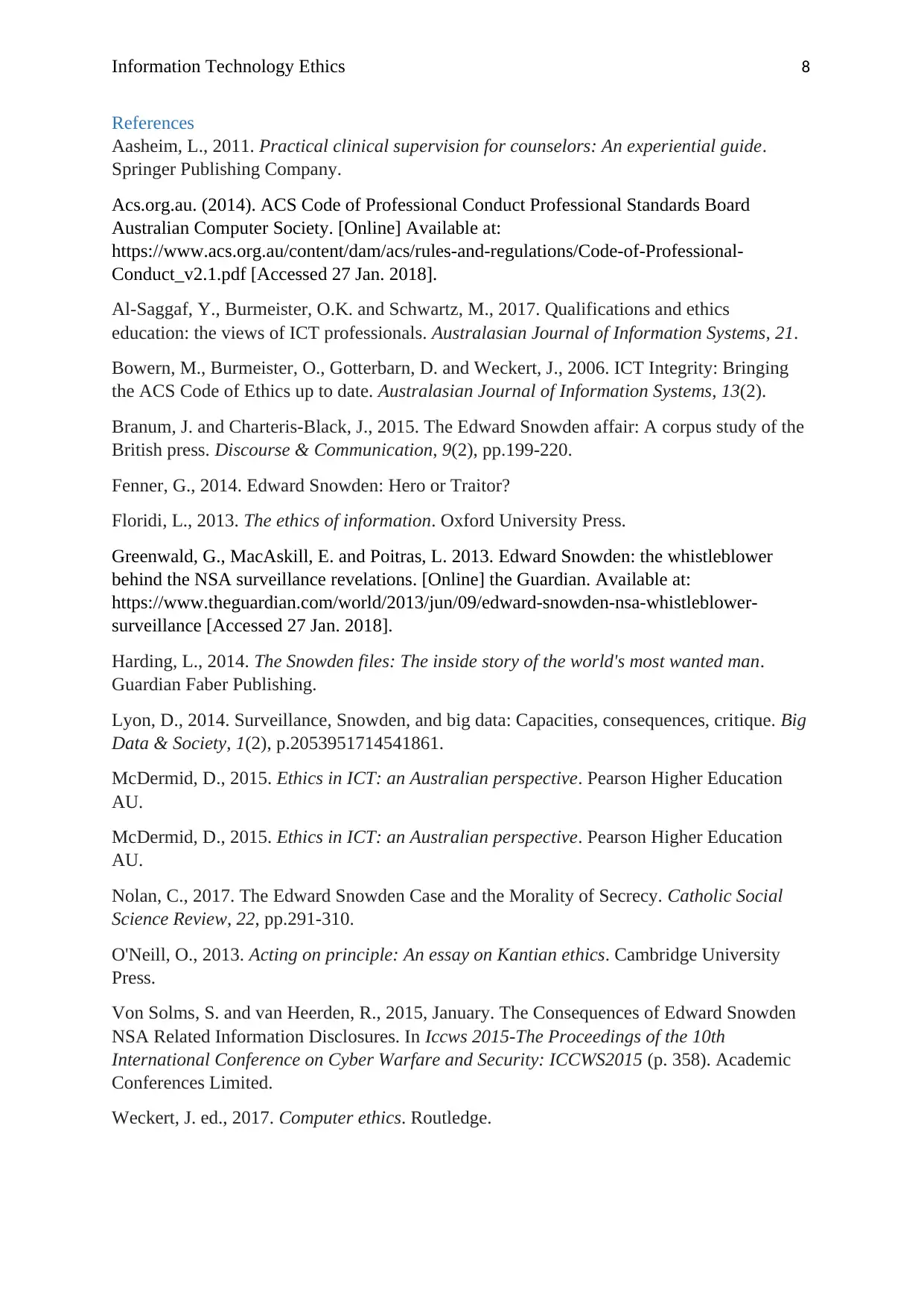
Information Technology Ethics 8
References
Aasheim, L., 2011. Practical clinical supervision for counselors: An experiential guide.
Springer Publishing Company.
Acs.org.au. (2014). ACS Code of Professional Conduct Professional Standards Board
Australian Computer Society. [Online] Available at:
https://www.acs.org.au/content/dam/acs/rules-and-regulations/Code-of-Professional-
Conduct_v2.1.pdf [Accessed 27 Jan. 2018].
Al-Saggaf, Y., Burmeister, O.K. and Schwartz, M., 2017. Qualifications and ethics
education: the views of ICT professionals. Australasian Journal of Information Systems, 21.
Bowern, M., Burmeister, O., Gotterbarn, D. and Weckert, J., 2006. ICT Integrity: Bringing
the ACS Code of Ethics up to date. Australasian Journal of Information Systems, 13(2).
Branum, J. and Charteris-Black, J., 2015. The Edward Snowden affair: A corpus study of the
British press. Discourse & Communication, 9(2), pp.199-220.
Fenner, G., 2014. Edward Snowden: Hero or Traitor?
Floridi, L., 2013. The ethics of information. Oxford University Press.
Greenwald, G., MacAskill, E. and Poitras, L. 2013. Edward Snowden: the whistleblower
behind the NSA surveillance revelations. [Online] the Guardian. Available at:
https://www.theguardian.com/world/2013/jun/09/edward-snowden-nsa-whistleblower-
surveillance [Accessed 27 Jan. 2018].
Harding, L., 2014. The Snowden files: The inside story of the world's most wanted man.
Guardian Faber Publishing.
Lyon, D., 2014. Surveillance, Snowden, and big data: Capacities, consequences, critique. Big
Data & Society, 1(2), p.2053951714541861.
McDermid, D., 2015. Ethics in ICT: an Australian perspective. Pearson Higher Education
AU.
McDermid, D., 2015. Ethics in ICT: an Australian perspective. Pearson Higher Education
AU.
Nolan, C., 2017. The Edward Snowden Case and the Morality of Secrecy. Catholic Social
Science Review, 22, pp.291-310.
O'Neill, O., 2013. Acting on principle: An essay on Kantian ethics. Cambridge University
Press.
Von Solms, S. and van Heerden, R., 2015, January. The Consequences of Edward Snowden
NSA Related Information Disclosures. In Iccws 2015-The Proceedings of the 10th
International Conference on Cyber Warfare and Security: ICCWS2015 (p. 358). Academic
Conferences Limited.
Weckert, J. ed., 2017. Computer ethics. Routledge.
References
Aasheim, L., 2011. Practical clinical supervision for counselors: An experiential guide.
Springer Publishing Company.
Acs.org.au. (2014). ACS Code of Professional Conduct Professional Standards Board
Australian Computer Society. [Online] Available at:
https://www.acs.org.au/content/dam/acs/rules-and-regulations/Code-of-Professional-
Conduct_v2.1.pdf [Accessed 27 Jan. 2018].
Al-Saggaf, Y., Burmeister, O.K. and Schwartz, M., 2017. Qualifications and ethics
education: the views of ICT professionals. Australasian Journal of Information Systems, 21.
Bowern, M., Burmeister, O., Gotterbarn, D. and Weckert, J., 2006. ICT Integrity: Bringing
the ACS Code of Ethics up to date. Australasian Journal of Information Systems, 13(2).
Branum, J. and Charteris-Black, J., 2015. The Edward Snowden affair: A corpus study of the
British press. Discourse & Communication, 9(2), pp.199-220.
Fenner, G., 2014. Edward Snowden: Hero or Traitor?
Floridi, L., 2013. The ethics of information. Oxford University Press.
Greenwald, G., MacAskill, E. and Poitras, L. 2013. Edward Snowden: the whistleblower
behind the NSA surveillance revelations. [Online] the Guardian. Available at:
https://www.theguardian.com/world/2013/jun/09/edward-snowden-nsa-whistleblower-
surveillance [Accessed 27 Jan. 2018].
Harding, L., 2014. The Snowden files: The inside story of the world's most wanted man.
Guardian Faber Publishing.
Lyon, D., 2014. Surveillance, Snowden, and big data: Capacities, consequences, critique. Big
Data & Society, 1(2), p.2053951714541861.
McDermid, D., 2015. Ethics in ICT: an Australian perspective. Pearson Higher Education
AU.
McDermid, D., 2015. Ethics in ICT: an Australian perspective. Pearson Higher Education
AU.
Nolan, C., 2017. The Edward Snowden Case and the Morality of Secrecy. Catholic Social
Science Review, 22, pp.291-310.
O'Neill, O., 2013. Acting on principle: An essay on Kantian ethics. Cambridge University
Press.
Von Solms, S. and van Heerden, R., 2015, January. The Consequences of Edward Snowden
NSA Related Information Disclosures. In Iccws 2015-The Proceedings of the 10th
International Conference on Cyber Warfare and Security: ICCWS2015 (p. 358). Academic
Conferences Limited.
Weckert, J. ed., 2017. Computer ethics. Routledge.
⊘ This is a preview!⊘
Do you want full access?
Subscribe today to unlock all pages.

Trusted by 1+ million students worldwide
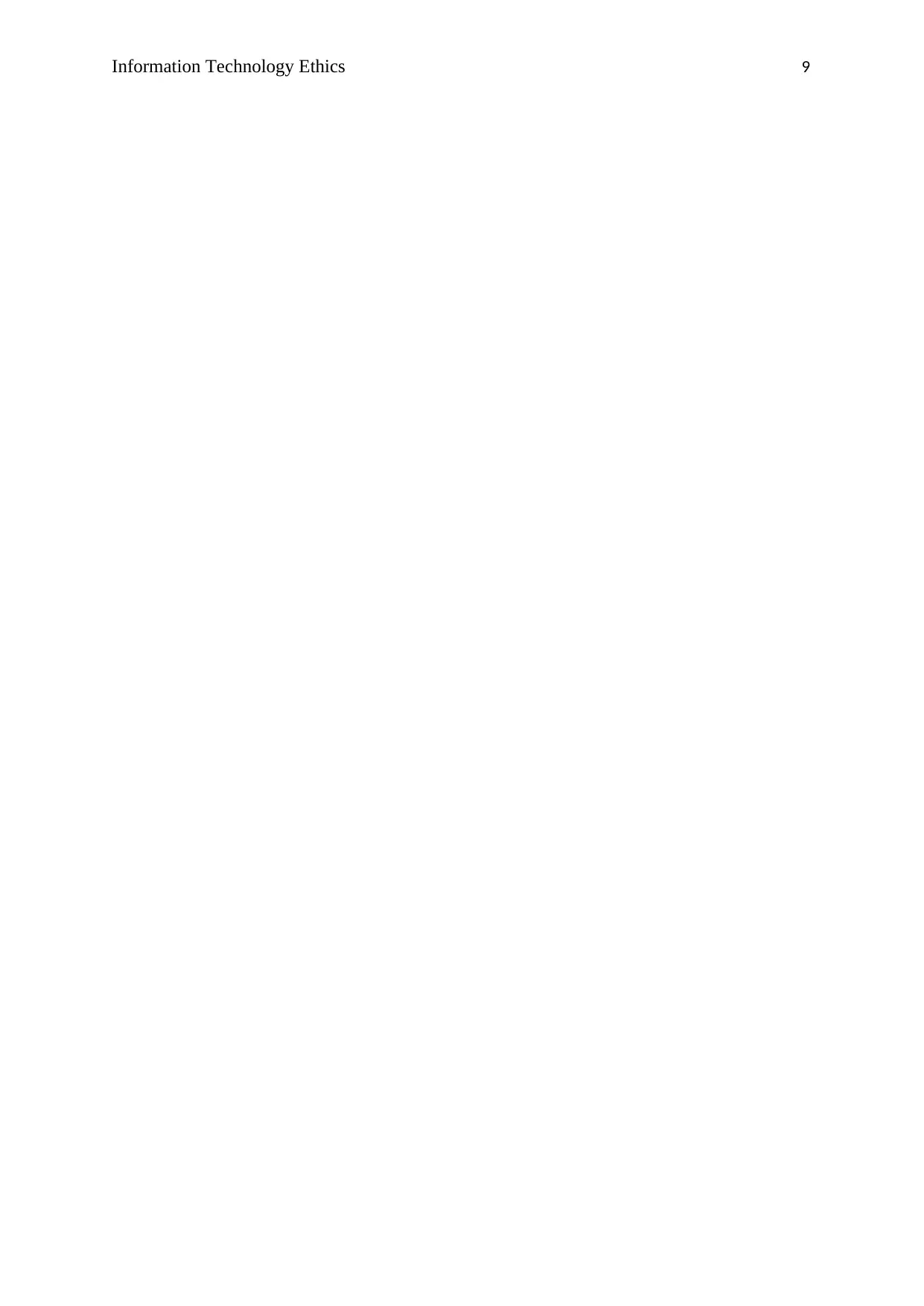
Information Technology Ethics 9
1 out of 10
Related Documents
Your All-in-One AI-Powered Toolkit for Academic Success.
+13062052269
info@desklib.com
Available 24*7 on WhatsApp / Email
![[object Object]](/_next/static/media/star-bottom.7253800d.svg)
Unlock your academic potential
Copyright © 2020–2026 A2Z Services. All Rights Reserved. Developed and managed by ZUCOL.





